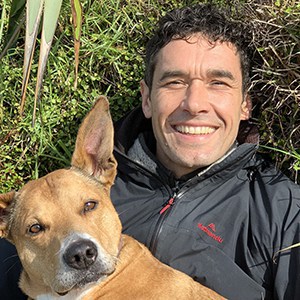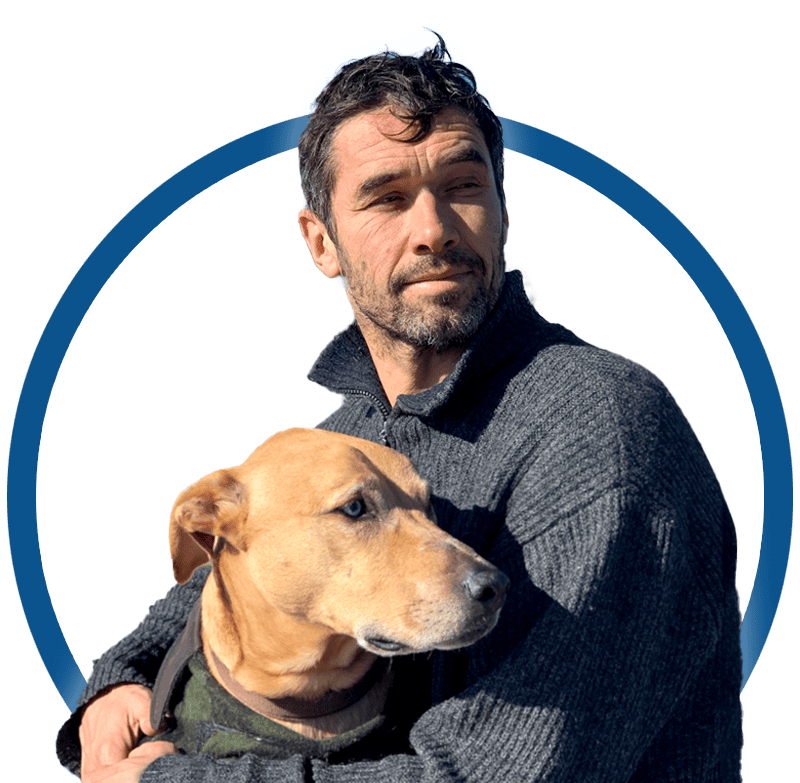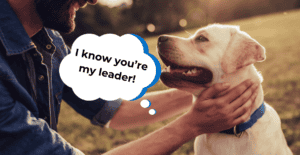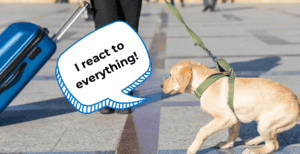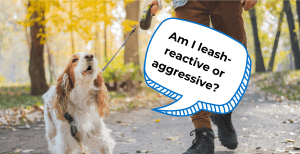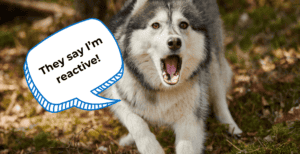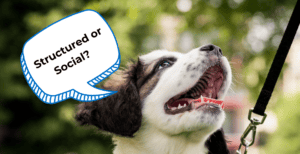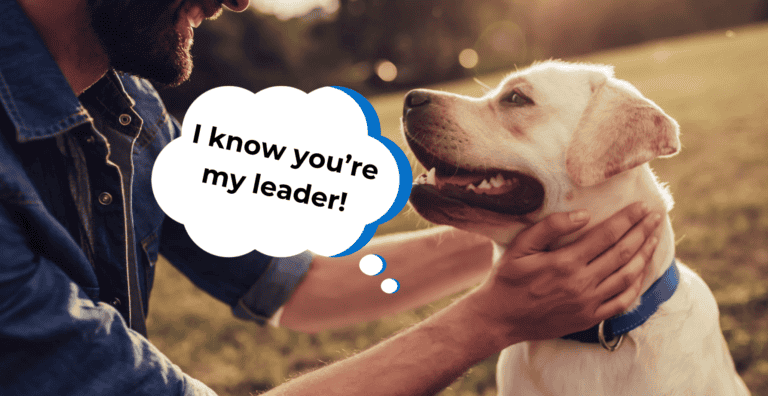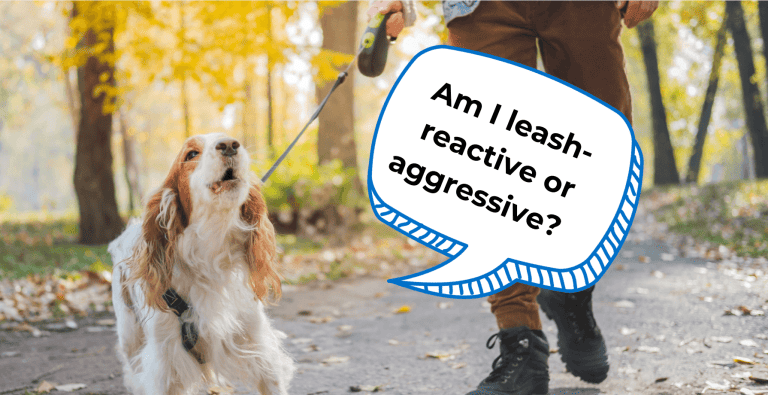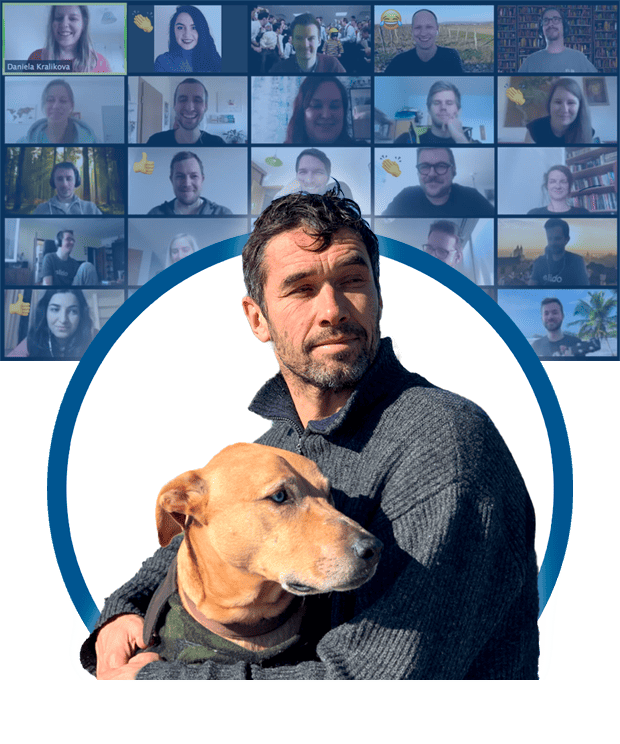Listen above or on iTunes / Spotify (Tap the subscribe button — it’s free and keeps you updated!)
Today’s Guest
Dr. Colleen Dell
My guest today is Dr. Colleen Dell, who is a Centennial Enhancement Chair in One Health and Wellness at the University of Saskatchewan. She is a Professor in the Department of Sociology and School of Public Health. Dr. Colleen’s recent research projects include the use of therapy dogs to help people with addiction and other mental health issues, and she has worked extensively with some of the most dangerous prison inmates.
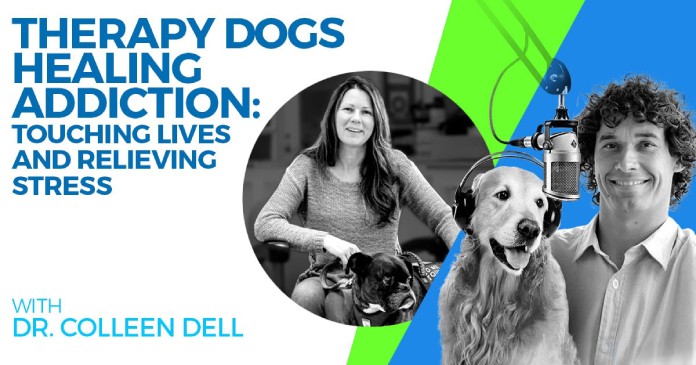
Dr. Colleen, in her position at One Health and Wellness, founded the Paws Your Stress program, which is offered in partnership with Peer Health and the St. John Ambulance Therapy Dog program.
Amazingly, this program is now being offered online so that these incredible dogs can continue to help those in need, during the COVID-19 pandemic!
You’ll Hear About
- [05:30] How the therapy dogs work with prisoners
- [08:30] How our own energy reflects in dogs’ behaviour with us
- [11:30] The power of Bond, Trust and Respect (BTR) in all relationships
- [13:30] Dogs waking people up when they’re having a nightmare
- [15:00] Dr. Colleen training her own dog, Subie, to be a therapy dog
- [19:25] The therapy horse who chose his own patients
- [22:00] Can any dog be a therapy dog?
- [24:30] How different types of service-dog personalities suit different types of people/patients
- [29:50] Peanut’s special talent
- [32:00] One particular condition in people that makes dogs uneasy
- [35:10] Why dogs should not be in charge
- [39:30] The power of your own energy and tone of voice
- [46:15] More about Colleen Dell and how to get involved
How You Can Help
Visit the links below to learn more about Dr. Colleen and her Therapy Dog Programs. Tap into the program yourself, or suggest it for a loved one. Also see tips on how you and your dog can help each other through stressful times.
Links & Resources
Watch Dr. Colleen’s great Ted Talk HERE:
Learn more by tuning into the podcast!
Thanks for listening—and again, don’t forget to subscribe to the show on iTunes / Spotify to get automatic updates.
Cheers,

~Doggy Dan 🙂
| Doggy Dan: [00:00:30] [00:01:00] | Hello, and welcome everybody to another podcast show with Doggy Dan. And today, I am with Dr. Colleen Dell. Now, this is going to be so fun because Dr. Colleen, she seems to be such a fascinating person. She's touched into so many different areas of working with dogs, and veterans, dogs who are entering prisons, dogs who are working with people with serious trauma, dogs who are working with people who have addictions, and even dogs who are helping students with stress at university. So, Dr. Colleen Dell, she's a PhD who was appointed a Centennial Enhancement Chair in One Health and Wellness at the University of Saskatchewan in 2016, and that is in Canada. |
[00:01:30] | And she had a focus on addiction and mental health. She's also a professor in the Department of Sociology, and School of Public Health. She's spoken on TEDx. And basically, she works locally, nationally, globally to attain optimal health for people, domestic animals, wildlife, plants, and then our environment. So, that's what One Health does. It's basically a fascinating program that you're involved with, Colleen. It's an honor to have you here today. Welcome. |
| Dr. Colleen Dell: | Thank you. It's so great to be on your show. It's really great to meet you virtually. |
| Doggy Dan: [00:02:00] | Yeah, one of the things about you is you're so hard to introduce. You're a professor, you've got 3000 hours of experience, providing community based service to different assisted interventions. Can you put it in your own words what you do? You've got such a wealth of canine behavioral psychology, knowledge of extreme canine professional dog training in Illinois. Tell us in your own words, who you are, what you do, and what your passion is. |
| Dr. Colleen Dell: | Yeah. Well, that's a big question. So, my whole background is in criminal justice and social justice. |
| Dr. Colleen Dell: [00:02:30] | And it threads through everything. So, my background has been working with women and men in prison, and then after the PhD, and I started teaching, it really went into addictions. So, addictions obviously is an important part of prison. It's why a lot of people are there. And after almost 20 years of being in the field, I was like, “I'm doing the same thing over and over again. We're seeing the same theories. We're looking at these issues in the same way. Either I'm really tired and I need to give up and do something else, or we need to look at things differently.” |
| [00:03:00] [00:03:30] | And just by chance someone said, “Well, what about animals? Do animals fit in there anywhere? Do you want to work with animals?” And I was like, “Hmm, I don't know. I have a dog.” I have two dogs and two cats at the time. And I honestly went home, and I Googled dogs and addiction. And one study came up by Wesley in the States. And it showed that therapy dogs were important to people. So, these dogs who were visiting an addiction treatment center were important to them. And it was from there I was like, “Oh, that's interesting.” |
| And I can ask the question a little bit differently. Right? Of looking at addictions, and seeing, how can we do things different in the addictions field looking through the lens of the animal, incorporating the animal at the same time? | |
| Doggy Dan: [00:04:00] | And so, am I correct in saying it's really a case of you're working with not so much the prevention, but those people who are in trouble, and trying to help them out of trouble with the use of these dogs primarily, is that right? |
| Dr. Colleen Dell: [00:04:30] | Yeah. On the social justice side. So, in the prisons and so forth, but on the other side, when we're working in the university during exam time, stressful time, then I would say it's more of a prevention for mental health. Right? |
| Doggy Dan: | Yeah. |
| Dr. Colleen Dell: [00:05:00] | But underlying whether it's that student in the university or it’s that prisoner in isolation, right, who's incarcerated, both are disconnected. And that's where the animal comes in. And for me, that's where the dog comes in, right? It’s helping to make that connection for individuals who are missing that, who are isolated. Again, whether it's mental health, or it's a physical isolation and obviously mental too, if you were in prison. |
| Doggy Dan: [00:05:30] | Like I said, there's so many areas we could go, and I'm really just going to let this podcast really just go its own way. And I'm going to follow my own passion, which I have a big passion for helping men who are in trouble. And yeah, so, those prisons, and those men who connect with those dogs, what is going on there? You talk about the connection, which I'm sure is a huge part of it. How do the dogs help more than just being … I mean, I'm presuming they're more than just a pet dog. |
| Dr. Colleen Dell: | Yeah. |
| Doggy Dan: | At the deepest level what's happening there? I mean, and do the dogs stay there? Do they live with them? Yeah. |
| Dr. Colleen Dell: | You know what? There's all kinds of programs- |
| Doggy Dan: | Gotcha. |
| Dr. Colleen Dell: [00:06:00] | … All over North America, or across the world when you're working with the dogs in the prisons. So, some of them are actually training dogs who have been in shelters to go out to be adopted into a family. Some of them are training service dogs. Right |
| Doggy Dan: | Yes. |
| Dr. Colleen Dell: [00:06:30] [00:07:00] | Some of those, again, are shelter dogs. Some of the programs are like animal assisted activities, they call it, whereas a companion animal, I take my therapy dogs, who's just a really friendly dog, and loves people. I take that dog into the prison. So, for people to have a connection and to visit with the dog, right? So, there's lots of different forms. And what I do with my partner, Darlene Chalmers, she's a social worker at the University of Regina here in Saskatchewan. And we take the dogs, we have therapy dogs. So, these really friendly, companion dogs that just love people, right? We take them there for a week at a time. And we do a program that looks at three things, bond with the dog, trust, and respect. So, B-T-R, BeTteR. |
[00:07:30] | And while we look at these three things, those individuals in our program are able to look at their recovery plans from addiction. So, we are doing things with the dogs. So, activities like learning to walk with the dog, and you would know this so well. So, if you're trying to establish a bond, you've been incarcerated, let's say someone's been incarcerated for 25 years. And we have people who have. That ability to bond with someone or have that connection is obviously incredibly difficult. But when we bring in the dog, and this is what you'll know, right? |
| [00:08:00] | You bring in the dog, and we perceive them not to judge, what the dog also does it gives you immediate feedback. So, we can talk to you. We can talk to an offender about whatever, anti-violence type of things, and we can do therapy and so forth, but you don't have that ability to get that immediate feedback. And that immediate feedback that comes from the dog that it's just real, right? |
| Doggy Dan: | Yeah. We often say dogs don't lie. If the dog's telling you this, that's the dog's truth. |
| Dr. Colleen Dell: [00:08:30] | Absolutely. So, on the first day let's say that people come in, we usually have a group of about 10. And we keep that cohort. We work with them over the years after. We go back every six months, we do online video conferencing with them, and so forth. But let's just say it's the first day, we have a group of 10, and let's take, I have Anna-Belle. Anna-Belle's a therapy dog I work with. She lives with me. And she's a bulldog. And she could be rather stubborn. She's very much about a dog who likes control in the house, or in her environment. So, if you don't have that sense of leadership or what have you, she isn't walking with you. Right? |
| Doggy Dan: | Yes. |
| Dr. Colleen Dell: [00:09:00] | So, all we do in that first beginning, one of the inmates comes up, they're walking with the dogs, all good. We switch off to the next inmate and Anna-Belle's like, “No. I'm going to sit down, no interest in walking with you.” Right? And he's like, “What's going on?” And it's like, “Hey, isn't this a beautiful opportunity to talk about, are you anxious? Are you nervous? You probably have your shoulders really slumped. You're not showing any leadership.” Because this is what she's looking for. Right? |
| Doggy Dan: | Totally. |
| Dr. Colleen Dell: [00:09:30] | So, how could we do that person-to-person? I can't say that to him. Right? |
| Doggy Dan: | No. |
| Dr. Colleen Dell: | Because it'd be like, “Oh, you just told me everything everyone's been telling me for the last 15 years.” But when Anna-Belle does it, and she's so cute, right? It's like, “Oh, well I really want to get Anna-Belle to walk with me.” |
| Doggy Dan: | Oh, that’s so beautiful. |
| Dr. Colleen Dell: | “So, help me Colleen do that.” Right? |
| Doggy Dan: [00:10:00] | It's so funny, it's exactly what I experienced with my dear son on the beach the other day. I told him to put one of our dogs on the lead. I think it was Moses. And my son, who's ten, he likes to play the fool, and he made a lot of screaming noises, and waved his arms around, and ran towards Moses. And Moses ran away, and he could not get this dog on the lead. So, I said, “Stanley, your energy is so high. You've scared Moses.” His face dropped. I said, “You scared him. See what happens if you crouch down and be calm.” And yeah, of course, dog came over very calm. And he put the lead, and he was so proud. |
[00:10:30] | And then exactly the same thing happened with Jack who is a much tougher dog. You can't scare Jack if you tried. And I told him to walk him, and he was just so weak, and loose, and let Jack lead. And I told him, “Take control.” And I showed him, “This is how you take control of the dog. You show Jack how to walk. You got to be in charge.” And you see him, shoulders back, like you say. And he's striding out turning and turning. And so, that's just brilliant. I love it. And those three words again, or the two things you said is the dogs don't judge. That's so huge. |
| Dr. Colleen Dell: | Yeah. Or at least we perceive them not to judge. Sometimes I think Anna-Belle is judging. |
| Doggy Dan: [00:11:00] | Well, they are judging, but it's from a very neutral, independent, like a non-personal place. It's not like I'm judging you because of the shoes you wear, or because of your name, or your skin color, or your shape. It's from your heart. They're judging your heart and your energy. |
| Dr. Colleen Dell: [00:11:30] | Yes. That's exactly it. You're right. That's exactly it. And how often do we have those opportunities to grow and expand from that type of feedback? Right? |
| Doggy Dan: | Yeah. |
| Dr. Colleen Dell: | And I think that's the … I hate using the word as an academic, but that's the magic. |
| Doggy Dan: [00:12:00] | I feel like we could stop the podcast right now. Just go back over what we … Because what you've touched on for me is just huge in terms of understanding what's really happening with our dogs. I'm trying to tie this back into my listeners, all you people listening out there, who have dogs and want to understand your dogs better, what we're saying here is … Can you remind me of those three words? There's the connection, is that right? |
| Dr. Colleen Dell: | Yeah. It's bond- |
| Doggy Dan: | Bond. |
| Dr. Colleen Dell: [00:12:30] | … Trust, and respect. BTR. And it comes from the video, it's called “Dogs on the Inside.” And it's a program in the States where they are training dogs, or they're rehabilitating, if you want to use that word, shelter dogs to live with people. And this is what they do through their program. And it was just like, “That just fits so well.” So, we designed ours around bond, trust, and respect. And especially, for people in prison, you just think about respect, or even people in our own families. Do we actually respect animals? Do we actually respect our pets? |
| Doggy Dan: | Well, that's where I was coming from. Yeah. |
| Dr. Colleen Dell: | Yeah. |
| Doggy Dan: [00:13:00] [00:13:30] | And it applies to humans as well, that when you meet a person, you have to try and bond. My wife and I we often talk about, you have to come alongside someone first, before you start telling them how to do something, or you have to bond, show that you care. And then you have to trust them, which yeah, slightly different, and respect. And then as we talked about, the dogs don't judge, however, they are acutely aware of the energetics, and especially your intentions of your heart. And I think as a dog owner, that's the bit which we often miss, that dogs are so acutely aware of whether you're stressed, would you say? Is that what the dogs are picking up on? |
| Dr. Colleen Dell: [00:14:00] | Oh, absolutely. And yeah, 100%. And this switches from the inmates that we work with, but we also work with veterans who have post-traumatic stress disorder that are working with service dogs. And those service dogs that are helping them with their psychiatric disabilities. Right? Whether they're waking them up from a nightmare, or helping them regulate their emotions, or telling them that, “Ah, you're starting to heighten. We better go in the corner here, calm down again.” That is the, I think, epitome, if that's the right word, of the dogs being so in sync with the human, even more so than the human possibly understanding where they're at. |
| Doggy Dan: [00:14:30] | So, let's just go through this again, because it's probably clear as … I don't know what the analogy is, clear as clear water. It's as clear as bottled water, but for some people listening, again, the importance here is, so you're saying that these dogs actually wake up veterans who are having nightmares. They can actually do that? |
| Dr. Colleen Dell: | Yes, absolutely. |
| Doggy Dan: | And they can calm them down? |
| Dr. Colleen Dell: | Yeah. |
| Doggy Dan: [00:15:00] | I didn't know that. So, that's just like, wow. I mean, how powerful is that? And then the other thing you're saying is when they're becoming stressed, the dog is aware of that, and it just alerts them to the fact they're getting stressed, and calms them down. Yeah? |
| Dr. Colleen Dell: [00:15:30] | Yeah. And for some dogs, that's a smell, right? They're able to smell certain hormones that are going on as they start to learn from their human. And in one of our projects, one of the ones we're doing now, but we've been doing it for a couple of years. And I had the opportunity to train a service dog. And that was a remarkable experience. And he was a family dog already. His name was Subie. And we had a really strong bond for certain reasons. We had a really strong bond. And then as part of this project, if I was asking the veterans to train dogs and to study them, it's like, “Well, I better train a dog too. So, I understand what I'm asking.” And my research partner, Darlene Chalmers, she did the same with a dog named Ruby. |
| But it was just amazing to me because I'm a researcher, right? So, I want the evidence. It's like, “Yeah, I understand the dogs do these things. Like they wake people up, and they know when someone's stressed, but I've never seen it.” Right? | |
| Doggy Dan: | Yeah. |
| Dr. Colleen Dell: [00:16:00] [00:16:30] | I haven't experienced it. So, here I am training Subie, he's with me all the time. I was teaching in a class, and he was sleeping. So, he's at the front of the room with me, and he's sleeping. And I put up a slide, and it was a lot of stats. And I looked at it, and I forgot, I totally forgot what I was going to teach my class. So, I had 120 eyes looking at me. And then I started to get really flustered. And it was like, “I really don't know what I'm doing with this slide.” So, it was probably a matter of 30 seconds. And then all of a sudden I feel Subie leaning on my leg. So, he got up out of his sleep, and there he was because he could tell. |
[00:17:00] | And I was like, so I didn't do any actions. I'm just staring at the screen. So, he picked up on my energy, whether he's smelling the stress hormone, or whatever's going on. And that was my a-ha moment. And it was like, “Okay, now I believe because I experienced it.” And we worked with that. And he did some pretty amazing things with his life. |
| Doggy Dan: | And that allowed you probably to bridge into your discussion, the stuff you wanted to talk about. You could probably talk about Subie, and what he'd done, and yeah. |
| Dr. Colleen Dell: | Absolutely. Yeah. |
| Doggy Dan: | Wow. Do you want to tell us anymore about Subie? I know what it's like to have a very special dog. |
| Dr. Colleen Dell: | Yeah. There are those really special ones, right? |
| Doggy Dan: | What did you learn from him? What were the main things? What did he do? |
| Dr. Colleen Dell: [00:17:30] | Subie was selfless. He was absolutely selfless. And I got him when my brother had died. And then, so I had him as a little puppy, and probably got a little bit of separation anxiety because I used to sit with him on my lap so much. But then at about three, okay, you had a lot of separation anxiety. I didn't understand what I was doing, right? |
| Doggy Dan: | Yeah. |
| Dr. Colleen Dell: [00:18:00] [00:18:30] | … with training the puppy. So, anyway, at three, he got a job as a therapy dog, a volunteer therapy dog. And he excelled at that I think so much because he's so used to giving comfort, and he was selfless. And I'm just going to give you an example, and it ties into, again, the service dogs, the therapy dogs just knowing and sensing what's going on. We had a terrible tragedy here in Canada a couple of years ago where a bus had hit another bus of young hockey players. They were all young teens. And 16 were killed, and 13 were injured. And in this small community, we went to the memorial for the community, which was absolutely packed. Right? |
| Doggy Dan: | Hmm. |
| Dr. Colleen Dell: [00:19:00] | And they had a number of therapy dogs thinking that this might help some individuals. And that was another point where it was really interesting to watch him because at this point he was really fine tuned with seeking out stress. That was his thing. And they were in an arena, and he would go down a row, saying hi to people, people petting him. And then he would choose specific people he would go up to, and he would hug. Right? |
| Doggy Dan: | Yeah. Totally. |
| Dr. Colleen Dell: | And it was interesting because he was choosing people who were very, very stoic. So, who were probably holding it in, that grief so hard. Right? So, that was Subie. He was amazing and selfless. Yeah. |
| Doggy Dan: [00:19:30] [00:20:00] | Yeah. I saw once a program about a documentary which is similar, how a horse was taken into a hospital, and the horse would walk around and choose which doors to go in. And the horse literally was picking the most unbelievable …. It was often people who'd only had a few days to live, or a week to live, or somebody who … And the horse said, “I want to go and see this person.” So, they have another sense, which is … I got four dogs, or had four or five dogs in the property, the one who passed away called Peanut, she passed away in 2018. She was a bit of a Subie. She had such love. And there was one day towards the end of her life, she was probably 12 years old, and she'd stopped wanting to wander down the other end of the house years earlier. |
[00:20:30] | So, she’d hardly wandered down there. In the last five years she'd probably been down two or three times. She just didn't bother. And then one day she was up out of her bed, almost pawing at the door, telling me to open it to go down the corridor. And I was like, “Why?” Now, my wife had a studio where she did work with people. She's a physio and a trained counselor, energetically works with people. And Peanut walked down the corridor, and looked at the door, and said, “Open it.” Get it open fast, quick. Let me in. I've got to get in.” I was like, “What do you want to go in there for?” I opened the door. She marched in. Well, actually, before I opened it and let Peanut in, I looked at my wife and said, “Peanut’s here, Peanut Butter wants to come in.” |
| [00:21:00] [00:21:30] | And my wife gave it a thumbs up, meaning, “Yep, she's absolutely right. She needs to be here.” She went in, there was a lady on the couch, on a raised table. And Peanut went straight in, laid down underneath her. And I thought, “Wow.” Anyway, a bit later I said to my wife, Jenni, I said, “What was that about? Was Peanut correct? Was it appropriate?” Jenni said this woman had just at that moment said, “I really don't understand or have no comprehension or understanding of what unconditional love is.” |
| Dr. Colleen Dell: | Oh my gosh. Wow. |
| Doggy Dan: | She said, “I've never experienced it. People always want something from me. It's, ah, transactional, give me this … I'll give you this because I want that. But what's unconditional love?” And at that point Peanut came in and just lay. And this lady loved dogs. She absolutely loved dogs. So, how Peanut knew, how these animals do it? I don't know. That's beautiful just to hear how you work. And so tell me, something I'm always fascinated about is, I guess, some dogs are better suited to this than others. In fact, surely some dogs are not cut out for this at all. Is that- |
| Dr. Colleen Dell: | Yeah. |
| Doggy Dan: | … How do you see that? |
| [00:22:00] Dr. Colleen Dell: [00:22:30] | Absolutely. And I think that's where the animal welfare component comes into all this, right? As human beings, we're very much about ourselves. I don't think we do that great of a job taking care of our planet, or our animals, personally. And I think that includes our companion animals as well. Right? It's like, “What can you do for me? What can you do for me?” And I'm going to put myself in that category too. Right? |
| Doggy Dan: | Yeah, me too. |
| Dr. Colleen Dell: [00:23:00] | It's what we do. For me working with dogs as therapy dogs was really interesting in the beginning because I really started to acknowledge the personality of the dog. And when I started doing some testing, we work with St. John's Ambulance here with our therapy dog program, and when I started to do the dog testing, it became really evident really quick as soon as the dog would come in the room, whether they absolutely love people, and they want to give them that attention, or they're just there, and maybe they're there for their owner. Right? Because he's telling me to do this, so okay, you can pet me. So, it was just like I really clued in there around, “Okay … ” And we know this, that they each have their own personalities. |
|
[00:23:30] [00:24:00] | And you know that really well through dog training, but it was about, “Okay, so if you're not cut out to be a therapy dog, maybe you like agility, or maybe you like to do obedience, or you're good at something else.” Right? And so, I think with more people talking about therapy dogs, and so forth, it's just like, “Well, how can I make my dog be a therapy dog?” And you can't, you can do the basic training, and obedience, things like that. But they have individual personalities. And that human-animal bond is so important to them as well. And I think that's where I've shifted a bit, and putting us more on an equal plane, even though I know in society that we don't have equal roles. But at least for us in our research, also trying to see and incorporate the dog as a co-researcher to the best that we can. |
| Doggy Dan: [00:24:30] | Yes. Great. So, just going into that a bit more, what would you say are the main characteristics or personality traits in a dog… What are the most useful or powerful? Are there different ones for assisting veterans? Could you pick out a couple? Or prisons? Because I'm guessing the traits you need for prisons is different from working with people who have addictions, is that correct? |
| Dr. Colleen Dell: | Yeah. |
| Doggy Dan: | Or is it pretty much the same? Is there anything? |
| Dr. Colleen Dell: [00:25:00] | Well, it's really interesting because, so for the service dogs, we're seeing more and more with the service dogs who're waking the veterans up, and they're with them all the time. And those are the ones who go into the stores with them, and so forth. So, a service dog, a lot we're seeing are more specifically bred, like you would have as a seeing eye dog. Right? And some dogs absolutely are from shelters, and they're trained and so forth. For the therapy dog side, I think the traits really depend, like you were saying they're depending on where you're going. |
| [00:25:30] | So, at a seniors' residence, you're going to need a pretty calm dog. Right? Because you don't want the dog too hyper at a seniors' residence. So, you want that calm dog, but you really want that dog that is seeking out attention from the individuals. So, well, I'm sure all dogs are coming up to you, but if someone goes up to a dog, and the dog shuns them, or goes away, or doesn't want to be pet by them, if you're already going into let's say an addiction treatment center, and I bring in my dog, and my dog doesn't even want to be pet by you, well, that's not helpful. Right? |
| Doggy Dan: | Yeah. |
| Dr. Colleen Dell: [00:26:00] [00:26:30] | So, we want the dogs comfortable in any situation at all, but also matching their energy with where they're going. So, Subie at the memorial, he was a super calm dog. That's what you wanted. At the prison, Kisbey, she's now retired, but she's a therapy dog in my house, and she's just a barrel of laughs. She's a boxer. And the boxers are full of energy. Right? And they're funny. So, in the prison, that's a really good thing because it's not a very happy place. And the guys just like to play ball with her between doing their programming. Right? And she just absolutely loves that. And she's so happy. So, yeah, it's about the dog, and the dog wanting to be with people. That's number one. |
| Doggy Dan: | Beautiful. |
| Dr. Colleen Dell: | And that's not going to be every dog. Right? |
| Doggy Dan: | Got it. Yep. |
| Dr. Colleen Dell: | Yeah. And the other side is, ask them where they're going. |
| Doggy Dan: [00:27:00] [00:27:30] | Yeah. It's interesting because I was chatting with somebody about this the other day, about as a human, sometimes our energy can be so off. We all have like sometimes … not everybody, but sometimes I know I have had too much energy. And I've turned up at maybe somebody who's relaxing at the café, and their energy at the café, they've wanted to relax, at a maybe a two or three out of 10. And I've turned up with all this energy like a seven or an eight because I'm excited. And I've almost dumped it all on them, and I've walked off. And at least now I'm aware of when I sometimes do that, and I go, “I think I just dumped a load of energy.” It comes back to, I didn't come into that relationship with them, and create a bond, and feel where they were at. |
| So, it's actually interesting because it's the same as with humans. Can you gauge the energy of the situation you're in, or do you just come in with your bulldozer style energy, and not really feel where everybody's at? And yet at the same time, as you just mentioned as well, sometimes it's beautiful to be able to increase the energy if it's appropriate, add more energy, at a party maybe, and yeah… | |
| [00:28:00] Dr. Colleen Dell: | Yeah. And I think that's where the handler comes into. Right? |
| Doggy Dan: | Yeah. |
| Dr. Colleen Dell: [00:28:30] | So, we work at a psychiatric facility with forensic patients. And there usually the energy is pretty low. So, when I would take Kisbey in, if it was the right time, I would allow them to play ball with her, or I would allow her to get ramped up because everyone's in a good mood, or I could be meeting one-on-one with someone who just had some therapy, and is in a really low mood. So, I remember one time with Kisbey … and remembering the dogs always respond to that energy a lot too. Right? |
| Doggy Dan: | Totally. |
| Dr. Colleen Dell: [00:29:00] | So, the one person came in who usually likes to play ball with her. And he came in, and he just slumped and laid on the ground. So, Kisbey went over to him, and just laid beside him. And this is like super energetic Kisbey. But she already has that bond, trust, and respect with him, and she knew what he needed. So, for that half hour visit, I just sat on a chair, he laid on the ground and pet her. And that was it. Right? So, I think what I should say here is we, as the handlers, are always following the lead of the dog, right? |
| Doggy Dan: | Yep. |
| Dr. Colleen Dell: [00:29:30] | And sometimes we have to rein them in if I'm gauging what's going on. Because they're not 100% on all the time, nor am I reading a situation perfectly all the time. So, it's about us working together too with that bond, trust, and respect, and really working together as a team. |
| Doggy Dan: [00:30:00] | Totally. As you go through so much of it, it reminds me of dear Peanut. It's like my dog … she made me look so good. I could walk into almost any situation. And sometimes I literally did. I used to go, “Oh my gosh, I have no idea what's going on here.” And I'd look at Peanut, and I go, “Peanut, what do you reckon? Is that an aggressive dog, or is that an overexcited dog?” And she'd go, “Oh, that's just excited.” And this literally happened, there was a dog lunging and barking, and it was a big dog. I was like, “Oh.” |
| Dr. Colleen Dell: | Not sure. |
| Doggy Dan: [00:30:30] | “My dog is aggressive,” they'd said. And I looked and I thought, “Yeah, that is pretty scary. If that dog attacked Peanut I'm in trouble, we're all in trouble. I can see why you don't socialize that dog at all.” But Peanut was looking at me going, “Yeah, I can go and calm that one.” And I was like, “It's bigger than you Peanut. It could maul you.” She pulled me towards it, and sometimes it was better for me to just let her off-leash. And that's what I did. I just said, “Okay, be careful, stay calm.” or whatever. And I took the leash off. And she just walked over to this big, wooly, bouncing, barking, frothing, frenzied thing on a leash. |
[00:31:00] | And I honestly thought, “Baby, be careful, it's going to attack.” And she got close. And as soon as this other dog was able to … It's on two legs, this dog. It's lunging forward going “rah rah rah …”. As soon as it got close enough to sniff Peanut, it dropped on its back, lay on the grass on its back. |
| Dr. Colleen Dell: | Oh, God. There you go. |
| Doggy Dan: | And I was just almost crying. Oh, man. |
| Dr. Colleen Dell: | No kidding. Thank you Peanut. |
| Doggy Dan: | So, it's like, I would never have let her so close or at least not so quickly. But she could see it's just begging to be loved, to connect, for attention. |
| Dr. Colleen Dell: | Yeah, they're amazing. |
| [00:31:30] Doggy Dan: | So, they can really see stuff that we can't see or can't read as easily. Tell me, do you ever have a situation where you sometimes feel like the dogs … I mean, I guess, the first question is, can they sense bad energy, and what is bad energy? And then I'll lead into my next question, but what's your take around bad energy? I mean, we all talk about bad energies. Do they pick up on bad vibes? I mean … |
| [00:32:00] Dr. Colleen Dell: [00:32:30] | And I've been doing this for a little over eight years now, and I've worked within our forensic facility some very, as would be defined in the criminal justice system, as dangerous people, extremely dangerous people. I've not had one experience ever in that situation. Nothing that I ever picked up on. There was only one time where it was Kisbey and someone that she really liked at the forensic facility, a woman. And we were going to take pictures that day. And this woman came in and Kisbey really wanted absolutely nothing to do with her. And I didn't clue in. And then, I was like, “Hey Kisbey, come on. Let's … “ |
| [00:33:00] | I'm seeing that she doesn't want to go by her. So, I have her by the collar, so the woman could pet her a bit, and then Kisbey was backing up. And I thought, “What the heck?” I said, “Okay, let's do our picture now.” Right? And I sat in the middle. And then one of the mental health therapists there had said she's heavily medicated because she had been self-harming so bad for the past 24 hours. So, that's what that was. And so, I was like, “Okay.” So, what we did for the rest… again, I didn't want her to feel bad. And the next time she saw Kisbey, it was back to regular. Right? It was absolutely OK. |
| Doggy Dan: | Totally. |
| [00:33:30] Dr. Colleen Dell: [00:34:00] | So, I just sat and I pet Kisbey a lot, and I let her pet Kisbey on the head, mostly. Like, “Just pet her softly on the head.” I maybe said something like, “Kisbey's not feeling well today,” or something. It didn't matter what I said. Right? Just to have this calm, little session where she can pet Kisbey a bit. But I was really aware of Kisbey's uneasiness. So, I made sure that Kisbey got lots of treats while we were petting, and afterwards. And yeah, just wanted to make sure I was petting Kisbey a lot and talking to her plus the treats at the same time. Yeah. |
| Doggy Dan: [00:34:30] | Yep. I've experienced that myself where the dogs definitely pick up very easily when people are on drugs. I've noticed that. If they're on drugs, oh my dogs, they know it. The other one that the dogs seem to know is if an energy is too high, if somebody is too excited, as I mentioned before with my son, or a person turning up, and the energy's all getting stressful, and frustrated. That, for me, that was more the energy that's happening rather than the person themselves. It's almost like the person may have done … I guess, this ties in with the non-judgment that, you can have done a lot of bad things in your life, but that dog will not so much judge you on those things, as how you are in this exact moment in time. |
| Dr. Colleen Dell: | Absolutely. Yeah. |
| Doggy Dan: | Yeah. |
| Dr. Colleen Dell: [00:35:00] [00:35:30] | I have a really good example. This is a personal example. Recently my mom passed, in January. So, that will probably be the hardest time in my life. Right? That was very, very difficult. So, Anna-Belle and Kisbey, and we have, the new pup Subie. They're all very bonded to me, the new pup, not so much because he's new, right? Kisbey with me all the time. For the first four days after she had passed, Anna-Belle … and my husband had noticed too … she pretty well ignored me. And the reason for that is my energy. She needs to be in control. She's a very controlling dog. Even though I didn't feel out of control, I'm sure my emotions were just everywhere. Right? |
| Doggy Dan: | Yeah. |
| Dr. Colleen Dell: [00:36:00] | So, it took her about four days. It was around the fifth day where she started coming around again. It was like, to me, that was fascinating. And I completely stayed away from her because I had to respect that for her. She has to have control. I am also her leader. I am her alpha in the house. That's how I see it. That's how we work together. Right? |
| Doggy Dan: | Yes. |
| Dr. Colleen Dell: [00:36:30] | I'm the leader, in that, I wasn't being a leader. So, I'm sure she was just beside herself. I also had to make myself aware that I had to be strong too, because if I'm not a leader, she thinks she's a leader, and she is a horrible leader. She's just the worst. She is a bully. She is such a bully. So, I had to keep that in mind too. And that probably helped me move forward. Right? And getting better, because I was like, “Okay, I know what happens if I'm not a good leader for her.” And yeah. It was around the fifth day. So, yeah, it was a recent experience. It was like, “This is super interesting. And I totally understand what's going on here.” |
| Doggy Dan: [00:37:00] [00:37:30] | Yeah. Oh, that's great. Talk about leaders, Peanut, if you made her the leader, she was just perfect. That was the problem with her, you could … Well, it wasn't a problem. It was just a case of, I thought I was a great dog owner, dog trainer, but actually no, I had an amazing dog who knew how to … Whereas I've got other dogs, little Inca, by nature she was, not so much now, she was so nervous that she would not be a good leader. But she is so full of love. She's full of love, she’s the sort of dog who would come into the hospital and cuddle. But she's a good example of a dog who will pick up on anybody you see who is nervous. Because she's nervous by disposition, she will pick up on anyone who's timid or nervous around her, nervous of dogs. And she'll go for them a bit. |
| [00:38:00] | She'd be like snarling, and snapping. It's almost that mirror thing, that we often don't like people who remind us of ourselves, if we haven't dealt with that issue, we go, “I don't like that person. They are X, Y, and Z.” And we're just reflecting our own stuff that we haven't really looked at X, Y, and Z. And Inca's is fearfulness. |
| Dr. Colleen Dell: | Interesting. Yeah. |
| Doggy Dan: | It is. |
| Dr. Colleen Dell: | Yeah. They tell us a lot, eh? |
| Doggy Dan: [00:38:30] | They sure do. So, I'm sure you’ve got so many stories about different dogs doing crazy things, or things in the prisons, or maybe with addiction, people where you didn't really think it was going to happen like it did, and it just worked out, or something happened that blew you away. Have you got any thoughts of stories of a dog who did something you really could hardly believe or understand, or imagine how it had done it, or? |
| Dr. Colleen Dell: | Yeah, I can think of one that's about the dog welfare, but I also think about one that is about human welfare. If I can share on both. Yeah? |
| Doggy Dan: | Yeah, for sure. Love it. Love stories. |
| Dr. Colleen Dell: [00:39:00] [00:39:30] | The human one was at the prison where myself and Darlene hold the program, it's called Pawsitive Support. And this is our first cohort. So, the first time we were there, just developed the program. And we were working with a cohort of five individuals. And one of them, his name is Raymond, and he had been in for about 20 years at that time. So, he hadn't seen a dog in 20 years. So, that alone, I think, just has an impact, seeing the animal, and everything we've talked about. Imagine being that person, and now seeing the dog and interacting with the dog and so forth. So, I shared this story in my TED Talk because I just love this story because it was an a-ha moment for me too. So, Anna-Belle had to go under a badminton net. |
[00:40:00] | We had this obstacle course set up. And she had to go under a badminton net, but the badminton rackets were hanging down. The guys put them like that, and she's like, “No, I'm not going to do that. No, thanks. No, don't like it.” And I know she can do it, but she's like, didn't want to. So, I was on one side of Raymond, and Darlene is on the other, and we're saying, “Okay, Raymond. So, now you have to use your connection with Anabel to get her to trust you, that bond, that respect, to get her to go under this badminton net.” Because if I went on the other side, she'd come right away. So, but you need to do it. Right? |
[00:40:30] | He'd be like, [gruff voice] “Okay, Anna-Belle, come.” And I’m like, “No, be your authentic self, Raymond, just be yourself, be who you are.” And then be again like, [gruff] “Anna-Belle, come.” And then we're like, “Come on, just be yourself. Be who you are.” So, remember he's been in for 20 years. Right? So, I'm sure he doesn't even know who his authentic self is because he has this masculine to survive, needs this masculine images to survive in prison. So, it felt like a long time, but it was probably about three, four, five minutes. And then all of a sudden we heard, “Anna-Belle, come.” Like this really happy voice. And what did Anna-Belle do? Right under the net, and right to him. Right? |
| Doggy Dan: | Oh, beautiful. |
| Dr. Colleen Dell: [00:41:00] | So, what an experience for me to see that, and for him to experience that because, him and Anna-Belle, she became his little sis. And he still refers to her as a little sis. We send him pictures all the time of what she does, right? |
| Doggy Dan: | Beautiful. |
| Dr. Colleen Dell: [00:41:30] [00:42:00] | And he's done just absolutely amazing in prison since being in the program. And a lot of honesty, things that he wasn't honest with about before. But it was that connection he made with her. And it was seeing outside himself, because on the very last day, a lot of their friends, the cohort, their friends come, and they watch. And Anabel, they watch them do this obstacle course that they set up. And so, over a course of a week, they're able to do these obstacle courses without a leash on the dog, and the dog looking at them. Right? So, really great stuff. And they're very proud. But Anna-Belle sat down in the middle, and she was like, “I'm done. I don't want to do this anymore. |
| Doggy Dan: | How brilliant. |
| Dr. Colleen Dell: [00:42:30] | So, I'm always watching her. So, I'm looking at her ears, right? Her ears went down. It's like, “Okay, she's really done. She's not comfortable anymore.” Before I had even time to go get her, Raymond was up from the back of the room, scooped her up, big bulldog, went back, sat in his chair, and here's Anna-Belle sitting on him, big smile, her tongue's hanging out of her mouth. And I was like, “Oh boy, Raymond, you got it beyond anything.” Right? You so got it. And hoping that he takes that forward, and he has. |
| Doggy Dan: | Beautiful. |
| Dr. Colleen Dell: [00:43:00] | Okay, so, the other one I just want to share just quickly is about Anna-Belle again. So, a lot of stories about Anabel, but this is a very first place. So, this is an animal welfare story that I always share. So, the very first place she visited with me was a seniors' residence as a therapy dog. And she made this really strong connection with a man named Rubin, a very strong connection. And she would visit other people there, but she really always wanted to see Rubin. So, for about two years… So, then sadly, Rubin had passed on the morning we were supposed to go there. So, we did go in the afternoon still, and she was looking for Rubin, right? |
| Doggy Dan: | Yeah. |
| Dr. Colleen Dell: [00:43:30] [00:44:00] | And so, we came home, and my husband came home, and all the dogs went running to the door except Anabel. And that's unusual. Right? And so, he's like, “Well, where is Anabel?” I said, “Well, actually, Rubin had passed today. And she seems sad.” Because I thought she seemed sad, but I thought, “Oh, I'm just pretending, like I'm just making that up.” So, she was actually sitting in the living room when he came in, and she had her head on her little paws, and her head was down. And we're like, “She is.” Right? She is sad. She sensed what was missing. |
| And so, I took her back two more times, and she just searched for him. So, I was like, “This is cruel.” In my mind. “I'm not taking her back anymore.” We found somewhere else to visit, one-on-one with someone, and another dog ended up going there because I thought, “Wow, did she ever pick up?” Like, “How does she know?” I still can't explain that. | |
| Doggy Dan: [00:44:30] [00:45:00] | I got to jump in here because this is something so close to my heart that when Peanut passed away, she passed away very quietly. She'd been lying in the same spot for two days. Her heart just slowly stopped. I was there. I looked in her eyes as they closed. Nothing really changed. My dog, Jack, who's the dominant king, energy dog. He was in a car on the drive, with the other two. And I let all three dogs out, and they always come running in. It's the only time in his entire life he stopped at that door. And he couldn't see her. This is a doorway where there was no way he could … I mean, you might be able to just see this dog lying on a blanket, but she'd been lying there for two days, and you couldn't see that her heart had stopped. |
[00:45:30] | I mean, for the last two days I've been checking, looking at her to see if she had passed away, but he would not set foot. I even used food to try and bribe him to come in. He said, “There is no way I'm crossing this threshold.” He knew before he even got to that doorway. |
| Dr. Colleen Dell: | Interesting. |
| Doggy Dan: [00:46:00] | And there was no screaming. There was no crying from me. There was no scent, or smell released as far as I'm aware. It's like, she'd already been incontinent for a day, but he knew. He got out of that car, he ran to the back door, and stopped because he knew she'd already passed. And it was in honor of her. He didn't come in for ages. And then he went and did this process. Because he's a real dog who knows when people have passed over, animals have died. I've got a whole blog post, which I think I'll put a link to it on the page because we are coming to the end here. And so, I'll put a link to all of your stuff probably leads into, I'll put a link to that story. I'll put a link, I’ll grab some pictures of dear Subie. He sounds a darling, and Anna-Belle, and- |
| Dr. Colleen Dell: | Kisbey. |
| Doggy Dan: [00:46:30] | Kisbey. And so tell me, Colleen, what can people do if they want to get involved in this? I'll put your websites up, colleendell.ca, and your other website is … What's the other one? The therapy dogs one? |
| Dr. Colleen Dell: | Yeah, therapydogs.ca. And we now, because of COVID, obviously, are not out and about visiting. So, what we do is we have our therapy dogs online, on lots of different social media platforms. Yeah. |
| Doggy Dan: | Lovely. And some of you may be listening to this in many years' time. So, it may be that we've forgotten what COVID is hopefully. |
| Dr. Colleen Dell: | Yeah, hopefully. |
| Doggy Dan: [00:47:00] | And so, all of this podcast, we'll transcribe it so you can read it, the links are there. The photos, you can see Dr. Colleen. And yeah, what else can I say? It's been fascinating. I've learned so much. Loved it. |
| Dr. Colleen Dell: | Thank you. I loved being on. Thanks so much for the conversation. |
| Doggy Dan: | And maybe one day in the future we can dive into some more of that stuff, maybe the addiction side of things. I'm fascinated with that, and the trauma, and how the dogs can help. |
| Dr. Colleen Dell: | They're pretty amazing. |
| Doggy Dan: [00:47:30] | Oh, have a beautiful day. It's been a lot of fun chatting to you and thanks for sharing. |
| Dr. Colleen Dell: | For sure. Thank you so much for your time. |
| Doggy Dan: | Yup. Thank you. All right, guys. So, that's another episode of the Doggy Dan podcast show. Thank you for listening. And remember to subscribe, and tune in, and click on the link. And you'll be able to go and have a look at Colleen Dell, all the stuff that she does, and get involved. And yeah, help in any way that you can. Have a great day, guys. And as always love your dogs. |
Sign up to receive email updates
Enter your name and email address below and I'll send you periodic updates about the podcast.


